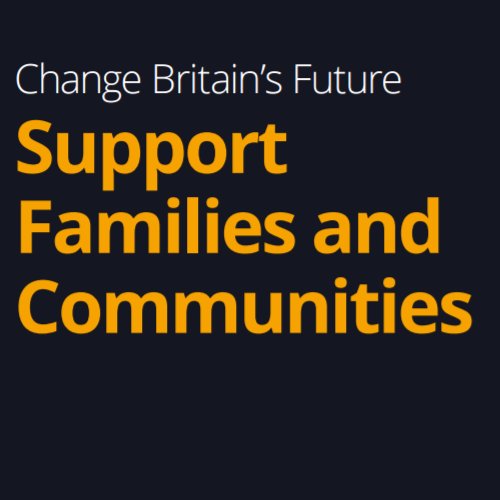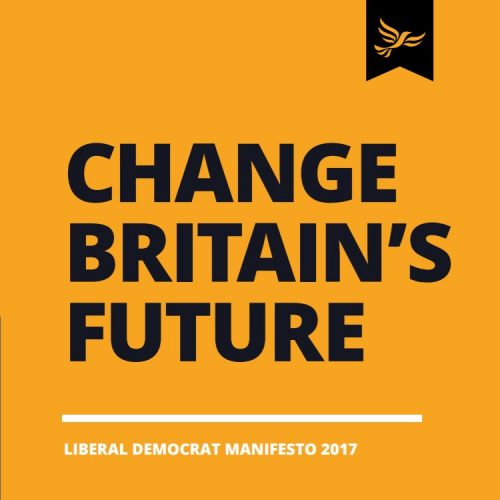Support Families and Communities is part of the Liberal Democrats Parties 2017 General Election Manifesto.
Liberal Democrats Manifesto 2017 PDF Format

Lib Dems Manifesto 2017 – Support Families and Communities
Liberal Democrats Manifesto 2017 – Support Families and Communities
A fair society is one in which everyone has the means to get by and the chance to get on. It means being able to provide for your family, afford somewhere to live and work within your community.
That’s why we will increase the availability of childcare to help parents who want to work and why we will ensure that the benefits system is fair – focusing on helping people and not just saving money. It’s why we will work to build more houses and make them affordable. And it’s why we will empower local councils and communities to run their own services – free from the interference of central government.
Our priorities in the next parliament will be:
- Extending free childcare to all two-year-olds and to the children of working families from the end of paid parental leave, and encouraging new fathers to take time off with an additional month’s paid paternity leave.
- Reaching a housebuilding target of 300,000 homes a year by 2022, including half a million affordable and energy-efficient homes, with direct government commissioning where the market fails to deliver.
- Introducing a new Young Person’s Bus Discount Card for young people aged 16–21, giving a two-thirds discount on bus travel.
6.1 Help with childcare costs
Parents often want to take time out from paid work to care for young children but in many families both parents want, or have, to work. The costs of childcare can be prohibitive and opportunities for flexible working are scarce.
In government, we were proud to introduce Shared Parental Leave and increases in free childcare but there are still gaps in the system. We will:
- Expand Shared Parental Leave with an additional ‘use it or lose it’ month to encourage fathers to take time off with young children. We would make Paternity and Shared Parental Leave a ‘day one’ right.
- Encourage employers to provide more flexible working, making this a ‘day one’ right, so that there is a presumption that work is flexible unless there is a clear business reason it cannot be.
- Provide 15 hours a week of free childcare to the parents of all two-year-olds in England. We will then prioritise 15 hours’ free childcare for all working parents in England with children aged between nine months and two years.
- Commit to an ambitious long-term goal of 30 hours’ free childcare a week for all parents in England with children aged from two to four years, and all working parents from the end of paid parental leave to two years. This will not only help parents afford to work, but will also help all children start school confident, happy and ready to learn.
- Ensure that this provision is fully funded at sustainable levels, provides flexibility for parents who work unsocial hours and enables parents to use free hours during school holidays.
6.2 Helping people find work
Having a paid job is for many people the key opportunity they need to be able to achieve their life goals. Unemployment isn’t just an economic challenge – it’s a personal problem and government must do everything it can to help those who can work find a job and provide for themselves and their family. To that end, we will:
- Separate employment support from benefits administration – making Jobcentres places of training and support into work.
- Take 13,000 children out of poverty by letting both parents earn before their Universal Credit is cut and also reverse cuts to the Family Element.
- Encourage people into work by reversing the cuts to Work Allowances in Universal Credit, enabling people to work for longer before their benefits are cut.
- Raise awareness of, and seek to expand, Access to Work, which supports people with disabilities in work.
- Improve links between Jobcentres and Work Programme providers and the local NHS to ensure all those in receipt of health-related benefits are getting the care and support to which they are entitled.
- Accelerate the roll-out of Individual Placement and Support, a proven approach to getting people with mental ill-health back into work.
6.3 Treating people fairly
The Liberal Democrats are clear – balancing the books on the backs of the poor and disabled, and demonising people who claim benefits, is neither acceptable nor responsible. Although all government budgets must be scrutinised to minimise waste and ensure value for money, this must not be used as an excuse to attack the poor and vulnerable. In any case it is more effective to tackle the causes of the benefits bill – low pay, high rents, unemployment and ill-health.
That’s why we will reverse unfair Conservative policies such as reducing support for younger people and cutting the benefits of people not fit for work. We will reinstate the legally binding poverty targets of the Child Poverty Act. We will:
- Uprate working-age benefits at least in line with inflation.
- Abandon the two-child policy on family benefits and abolish the Conservatives’ ‘rape clause’ where a woman has to declare children that are born as a result of rape in order to access benefits.
- Help young people in need by reversing cuts to housing benefit for 18-21-year-olds and increase the rates of Jobseeker’s Allowance and Universal Credit for those aged 18-24 at the same rate as minimum wages.
- Reverse cuts to Employment Support Allowance to those in the work-related activity group.
- Increase Local Housing Allowance (LHA) in line with average rents in an area, ensuring that LHA is enough for a family to pay their housing costs no matter where they live.
- Scrap the ‘bedroom tax’, while seeking to achieve the aim of making best use of the housing supply through incentivising local authorities to help tenants ‘downsize’.
- Scrap the discredited Work Capability Assessment and replace it with a new system, run by local authorities according to national rules, including a ‘real world’ test that is based on the local labour market.
- Withdraw eligibility for the Winter Fuel Payment from pensioners who pay tax at the higher rate (40%). We will retain the free bus pass for all pensioners.
- Ensure that those using food banks are aware of their rights and how they can access hardship payments where relevant.
6.4 Saving for and enjoying your retirement
Life expectancy is increasing. This is good news, but it brings challenges; older people may need a pension income that will last for 20, 30 or even 40 years.
We want Britain to be the best place in the world to save for, and enjoy, your retirement. We will :
- Maintain the ‘triple lock’ of increasing the state pension each year by the highest of earnings growth, prices growth or 2.5% for the next parliament.
- Establish a review to consider the case for, and practical implications of, introducing a single rate of tax relief for pensions, which would be designed to be simpler and fairer and would be set more generously than the current 20% basic rate relief.
6.5 Building more and better homes
The housing crisis in Britain has become an emergency. For far too long Britain has built many fewer homes than we need; unless we build enough to meet demand, year after year, we will find that housing costs rise further out of reach. That is why we have set an ambitious target of increasing the rate of housebuilding to 300,000 a year – almost double the current level. These new houses must be sustainably planned to ensure that excessive pressure is not placed on existing infrastructure.
We will:
- Directly build homes to fill the gap left by the market, to reach our housebuilding target of 300,000 homes a year, through a government commissioning programme to build homes for sale and rent. We will ensure that half a million affordable, energy-efficient homes are built by the end of the parliament.
- Create at least 10 new garden cities in England, providing tens of thousands of high-quality, zero-carbon homes, with gardens and shared green space, jobs, schools and public transport.
- Set up a new government-backed British Housing and Infrastructure Development Bank with a remit including providing long-term capital for major new settlements and helping attract finance for major housebuilding projects.
- End the Voluntary Right to Buy pilots that sell off housing association homes and the associated high value asset levy.
- Lift the borrowing cap on local authorities and increase the borrowing capacity of housing associations so that they can build council and social housing.
- Scrap exemptions on smaller housing development schemes from their obligation to provide affordable homes, and strengthen the hand of local government to prevent large developers reneging on their commitments.
- Require local plans to take into account at least 15 years of future housing need – focusing on long-term development and community needs.
- Create a community right of appeal in cases where planning decisions go against the approved local plan.
- Enable local authorities to:
– Levy up to 200% council tax on second homes and ‘buy to leave empty’ investments from overseas.
– Enforce housebuilding on unwanted public sector land.
– Penalise excessive land-banking when builders with planning permission have failed to build after three years.
– End the Right to Buy if they choose.
6.6 Buying and renting
House prices are high across the country – even where houses are available to buy, they are often unaffordable for first-time buyers. In many areas, the rental market has also become unaffordable. Young people, in particular, need support from the government to help them find and keep a home of their own. We will:
- Help people who cannot afford a deposit by introducing a new Rent to Own model where rent payments give tenants an increasing stake in the property, owning it outright after 30 years.
- Improve renting by banning lettings fees for tenants, capping upfront deposits and increasing minimum standards in rented homes.
- Help young people into the rental market by establishing a new Help to Rent scheme to provide government-backed tenancy deposit loans for all first-time renters under 30.
- Give British buyers a fair chance by stopping developers advertising homes abroad before they have been advertised in the UK.
- Give tenants first refusal to buy the home they are renting from a landlord who decides to sell during the tenancy at the market rate according to an independent valuation.
- Promote longer tenancies of three years or more with an inflation-linked annual rent increase built in, to give tenants security and limit rent hikes.
- Improve protections against rogue landlords through mandatory licensing and allow access for tenants to the database of rogue landlords and property agents.
- End the scandal of rough sleeping by increasing support for homelessness prevention and adequately funding age-appropriate emergency accommodation and supported housing, while ensuring that all local authorities have at least one provider of the Housing First model of provision for long-term, entrenched homeless people.
6.7 Investing in the transport we need
High-quality public transport is essential to building sustainable communities and the local and national economy. Britain needs better transport infrastructure, a modern railway system run for the benefit of its customers, and less congestion and pollution on the roads. We also need to ensure that local communities, particularly rural communities, remain connected with local rail and bus services, and that stations serve the needs of their local community. To build a transport system fit for the 21st century, we will:
- Ensure that new rail franchises include a stronger focus on customers, including a programme of investment in new stations, lines and modern trains.
We will allow public sector bodies and mutual groups involving staff and passengers to bid for franchises. We will continue the Access for All programme, improving disabled access to public transport as a key priority.
- As a result of severe failings that rise to the level of breach of contract, establish government-run companies to take over the running of Southern Rail and Govia Thameslink, with a long-term plan to find more effective and sustainable ways of managing these franchises involving greater powers for local government.
- Pursue the electrification of the rail network, improve stations, reopen smaller stations, restore twin-track lines to major routes and proceed with HS2, HS3 and Crossrail 2, including development of a high-speed network stretching to Scotland.
- Invest capital in major transport improvements and infrastructure. We will:
– Shift more freight from road to rail.
– Deliver the Transport for the North strategy to promote growth, innovation and prosperity across northern England.
– Develop more modern, resilient links to and within the south-west peninsula to help develop and diversify the regional economy.
– Complete East West Rail, connecting Oxford and Cambridge and catalysing major new housing development.
– Ensure London’s transport infrastructure is improved to withstand the pressure of population and economic growth.
– Support the takeover of metro services in London by London Overground.
– Encourage the swift take-up of electric and driverless vehicles.
- Develop a strategic airports policy for the whole of the UK, taking full account of the impacts on climate change and local pollution. We remain opposed to any expansion of Heathrow, Stansted or Gatwick and any new airport in the Thames Estuary and will focus instead on improving existing regional airports such as Birmingham and Manchester. We will ensure no net increase in runways across the UK.
To protect and extend local public transport, we will:
- Introduce a rail ombudsman to enforce passenger rights and improve the provision of compensation, with the power to sanction rail companies as appropriate.
- Introduce a new Young Person’s Bus Discount Card, for young people aged 16–21, giving a two-thirds discount on bus travel – allowing young people to access education, apprenticeships and work.
- Halt the decline in bus services and carry out a review of bus funding and bus policies. We will give principal local authorities the power to run, commission and regulate the bus network in their area.
- Provide local authorities and communities with the powers to improve transport and ticketing with the ability to introduce network-wide and smart ticketing systems.
- Design towns and cities as safe and attractive walking spaces and implement the recommendations of the Get Britain Cycling report.
6.8 Local communities working together
Liberal Democrats believe in community politics – in the power of local people to come together to solve their own problems and make a better life for their neighbourhoods. This means rejuvenating democratic local government in England and also supporting other forms of community organisation and empowerment. We will:
- Drastically reduce the powers of central government ministers to interfere in democratically elected local government.
- Remove the requirement to hold local referenda for council tax changes, ensuring that councillors are properly accountable for their decisions by introducing fair votes.
- Aim to increase the number of neighbourhood, community and parish councils and promote tenant management in social housing.
- Establish a government process to deliver greater devolution of financial responsibility to English local authorities and any new devolved bodies in England, building on the work of the Independent Commission on Local Government Finance. Any changes must balance the objectives of more local autonomy and fair equalisation between communities.
- Support social investment, ensuring charities and social enterprises can access the support and finance they need to strengthen their governance and deliver innovative, sustainable solutions to challenges in their communities.
- Enable central and local government to prioritise employee-owned and community-benefit companies in awarding procurement contracts by strengthening the Social Value Act.
- Grant new powers to local authorities to protect high streets and consumers by reducing the proliferation of betting shops and capping the maximum amount able to be bet on fixed odds betting terminals (FOBTs) at one time to £2.
6.9 Sustainable rural communities
A thriving rural community needs local services and community facilities such as schools, public transport, local shops, cultural venues and pubs. It needs enough homes, affordable for local families, to ensure those services are viable. Liberal Democrats understand the changes needed to support a living, working countryside. We will:
- Ensure that every property in the UK is provided, by 2022, with a superfast broadband connection with a download speed of 30Mbps, an upload speed of 6Mbps, and an unlimited usage cap.
- Invest £2 billion in innovative solutions to ensure the provision of high-speed broadband across the rural UK, working with local authorities and providing grants to help areas replicate the success of existing community-led projects.
- Set up a £2 billion Rural Services Fund of capital investment to enable communities to establish a local base from which to co-locate services such as council offices, post offices, children’s centres, libraries and visiting healthcare professionals.
- Work with Ofcom to ensure that mobile phone companies provide fast and reliable coverage in rural areas.
- Commit to preventing Post Office closures and protect Royal Mail’s Universal Service Obligation to deliver across the UK for the same price.
- Work with local authorities to deliver a significant increase in social and affordable housing in rural areas.
6.10 Access to culture and sport
Arts, media and sports are essential for personal fulfilment and quality of life
– they are part of what turns a group of people into a community. Funding for these organisations is put at risk with Brexit and the Liberal Democrats will ensure that we continue to invest in our cultural capital. We will:
- Maintain free access to national museums and galleries.
- Move towards introducing ‘safe standing’ at football clubs, requiring the Sports Grounds Safety Authority to prepare guidance for implementing this change.
- Protect the independence of the BBC and set up a BBC Licence Fee Commission, maintain Channel 4 in public ownership and protect the funding and editorial independence of Welsh language broadcasters.
- Protect sports and arts funding via the National Lottery.
- Maintain current standards of intellectual property (IP) protection with continuing co-operation on enforcement of IP generated in the UK and working within the EU to ensure the continuation of territorial licensing of rights.
- Create creative enterprise zones to grow and regenerate the cultural output of areas across the UK.
- Examine the available funding and planning rules for live music venues and the grassroots music sector, protecting venues from further closures.
Liberal Democrats Parties 2017 General Election Manifesto
Liberal Democrats Manifesto 2017 – Introduction
Liberal Democrats Manifesto 2017 – Protect Britain’s Place in Europe
Liberal Democrats Manifesto 2017 – Save our NHS and Social Care Services
Liberal Democrats Manifesto 2017 – Put Children First
Liberal Democrats Manifesto 2017 – Build an Economy that Works for You
Liberal Democrats Manifesto 2017 – Keep our Country Green
Liberal Democrats Manifesto 2017 – Support Families and Communities
Liberal Democrats Manifesto 2017 – Defend Rights, Promote Justice and Equalities
Liberal Democrats Manifesto 2017 – Make a Better World
Liberal Democrats Manifesto 2017 – Fix a Broken System















